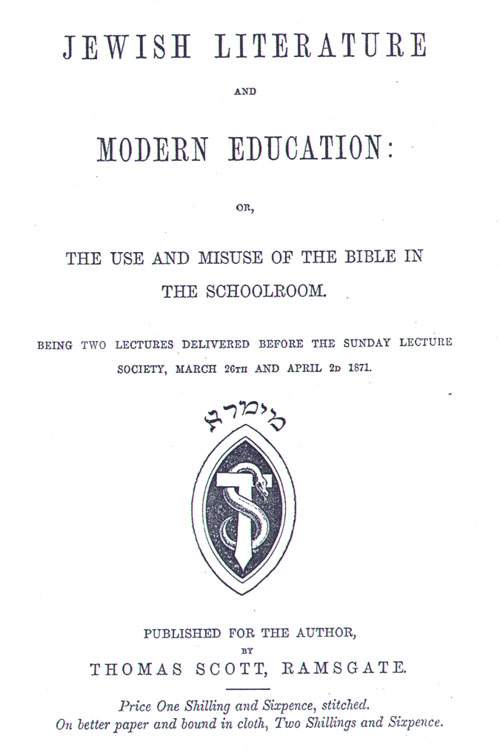![]() Sections: General Index
Present Section: Index
Next: I -
Introduction
Sections: General Index
Present Section: Index
Next: I -
Introduction
• Jewish Literature and
Modern Education: or, the Use and Misuse of the Bible in the Schoolroom.
Edward Maitland.
Edward Maitland.
Edited, for the author, by Thomas Scott, Ramsgate. 1871. 97 pp. And also by Trübner & Co.,
Information: This book, which
is nowadays difficult to find, is here at last presented to the Internet public
in the Anna Kingsford Site. This was
made possible because a copy of it
was most gently sent to us by Mr. Brian McAllister, from
Below you have a photocopy of its original cover, its title pages, its Preface, and the Synopsis of the two Lectures included in the book, with the links to the complete Html text:



(p. iii)
PREFACE
_________
WHETHER or not the Solution, given in these Lectures, of the “Religious Difficulty” in our National Education, be acceptable for practical application, is a question other than that of the intrinsic soundness of that Solution. It is to this only that my responsibility extends. The responsibility of declining to accept a proffered remedy must rest with those to whom the offer is made.
I had intended to keep these Lectures in manuscript, and repeat them wherever an audience might be found desirous of hearing facts stated without respect to aught but the facts. It is in compliance with very many and pressing solicitations that I have, by printing them, withdrawn them from further delivery as Public Lectures. My hope now is that the readers will not be less numerous than the hearers would have been, had I adhered to my original intention.
The Lectures are printed with the changes made
on their second delivery, in
(p. iv)
go from me without acknowledging my obligations to the series of small publications issued periodically by Mr. Thomas Scott of Ramsgate, to whose indefatigable self-devotion to the cause of “Free Inquiry and Free Expression,” the present rapid spread of information, and consequent movement of thought on religious matters, especially among the clergy of the Establishment, – (a movement far greater than the public is aware of) – is in no small degree attributable. The tracts entitled, The Defective Morality of the New Testament, by Professor F.W. Newman; The Gospel of the Kingdom, and The Influence of Sacred History on the Intellect and Conscience, – especially deserve mention for the use I have made of them. A few brief passages given as quotations, but without reference, are for the most part taken, with more or less exactness, from The Pilgrim and the Shrine.
E. M.
SYNOPSIS
_________
SECTIONS (pages)
2. DEFINITION AND FUNCTION OF EDUCATION (3)
3. THE SCHOOL BOARDS AND THE “RELIGIOUS DIFFICULTY” (6)
4. THE GENESIS AND HABITAT OF THE “DIFFICULTY” (11)
5. THE BIBLE AS A MORAL TEACHER (12)
6. THE BIBLE AS AN INTELLECTUAL TEACHER (24)
7. THE BIBLE “WITHOUT NOTE OR COMMENT” (27)
8. THE GOSPELS AND THE CHARACTER OF JESUS (35)
9. THE “
10. THE NEW TESTAMENT AS A RULE OF LIFE AND FAITH (41)
11. THE “CONTINUITY OF SCRIPTURE,” DOCTRINAL AND OTHER (48)
12. WHY THE BIBLE SHOULD BE TAUGHT IN OUR SCHOOLS (57)
13. HOW IT SHOULD BE DEALT WITH (65)
14. “NOTES AND COMMENTS;” THE PRINCIPLE OF THEIR CONSTRUCTION (69)
15. BIBLICAL INFALLIBILITY (74)
17. THE BIBLE AND MODERN COMMENTATORS (86)
18. THE BIBLE AND MODERN PRACTICE (88)
19. THE SCHOOL AND TEACHER OF THE FUTURE (94)